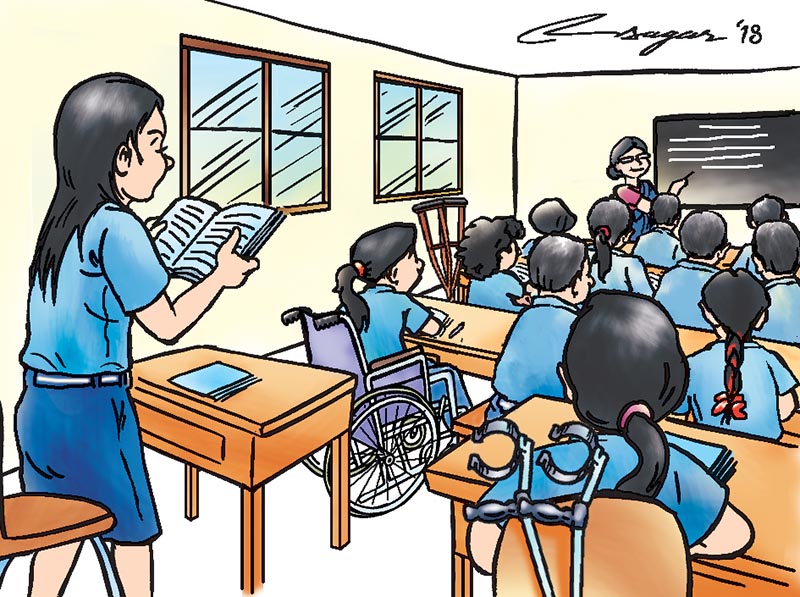Children’s education: Poverty determines the outcome
Poverty is a burning issue in least developed countries like Nepal. Poverty is scarcity, dearth or the condition of one who lacks a certain amount of material possessions or money.
It’s a multi-faceted concept, which entails social, economic and political elements.
As per the report released in 2010 by the Asian Development Bank, in Nepal 25.2 per cent of the population lives below the national poverty line. Over the past decades, unfortunately, the economic gap has widened between Nepali families.
Educational outcomes are always influenced by family incomes. Despite the existence of organisations working for poverty alleviation in Nepal, poverty has remained a stubborn fact of life. So, the Ministry of Co-operatives and Poverty Alleviation was established in May 2012 by the government to prioritise the co-operative sector so as to alleviate poverty. With the growth of the cooperative sector in the nation, citizens’ curiosity and that of the world co-operative movement has heightened.
It’s evident that socioeconomic disadvantage has a negative impact on different spheres of Nepali children’s lives. This write-up lays emphasis on the impact of poverty on Nepali children’s educational outcomes.
Children from low-income family backgrounds often start school already behind their agemates who come from more affluent families.
School readiness reflects on an individual child’s ability to excel in both academics and social life in a school environment.
For the holistic development of a child, physical well-being, emotional health and a positive approach to new experiences, age, appropriate social knowledge and cognitive skills are a must. It’s proved that poverty decreases a child’s readiness for school through aspects of health, family life, schooling and neighbourhoods.
A child’s home has a particularly strong impact on school readiness. Children from low-income families often don’t get motivated and don’t show willingness to learn the social skills necessary to prepare them for school. Children who are raised in poverty-stricken family usually lack parental care, inspiration and supervision. Studies show that children from lower income score significantly lower in vocabulary and communication skills, knowledge of numbers, copying and symbol use, ability to concentrate and cooperatively play with other children than those who come from higher income families. And a Canadian study showed that children from low socioeconomic neighbourhoods were less likely to pass a g A child’s home has a particularly strong impact on school readiness. Children from low-income families often don’t get motivated and don’t show willingness to learn the social skills necessary to prepare them for school. Children who are raised in poverty-stricken family usually lack parental care, inspiration and supervision rade 3 standard test.
In Nepal, poor school-children are forced to go to work to do the worst jobs or risky jobs to support their family financially.
They don’t go to school regularly; as a result, their academic performance obviously declines. When they are present in school, they are unlikely to be attentive due to their tired body as well as hopeless mindset.
They are filled with pessimism.
They have an inferior complexity.
Another thing that adds to their woes is feud. A feud between a husband and a wife in a poor family set-up is common. When a child’s parents get into arguments frequently at night, the child tends to leave home forever. Leaving home means leaving school, too. Also, when a father and a mother quarrel over trivial matters, the father is likely to exert his anger on their children.
When children are mature enough to understand their family condition, they will shift their attention from studies to employment.
I personally underwent this harrowing situation.
Another example is that some landlords employ children as domestic workers promising to give them an education and accommodation.
Even if children attend classes regularly, they fall behind their classmates in terms of presentation, English speaking skills and mathematics because their parents cannot provide them with essential materials to carry out school projects.
Apart from these, such children are deprived of everyday access to newspapers and the Internet.
They fail to keep abreast of current affairs or global news. A lack of these sources prevents poor children from outdoing other competitors in the academic field. SEE results illustrate this point.
Poor parents fail to counsel, inquire and help children with homework. Furthermore, poor parents fail to inculcate good culture into their children. Consequently, they tend to be disruptive, rowdy and impulsive.
In the end, they get expelled from school. A child’s financial condition is to be blamed for his misconduct and mischief.
Children raised in poor families cannot benefit from a higher level of cognitively stimulating materials available in their homes compared to those children raised in wealthy families.
Owing to poverty, children must attend alow-quality school where their talents are neither lookedfor nor nurtured.
Besides, financial strain limits the housing and neighbourhood choices available to low-income families, forcing them to live in neighbourhoods characterised by high levels of crime and unemployment, low levels of resources and a lack of collective efficacy among the residents.
Children start engaging in anti-social activities to earn money rather than getting an education.
Summing up, the government claims that it has made significant improvements on the previous student enrollments at the school level with around 97 per cent enrolment in grade one, however, the number falls off every year, and most students’ performance declines owing to poverty.
A child’s home has a particularly strong impact on school readiness.
Children from low-income families often don’t get motivated and don’t show willingness to learn the social skills necessary to prepare them for school. Children who are raised in poverty-stricken family usually lack parental care, inspiration and supervision
-






